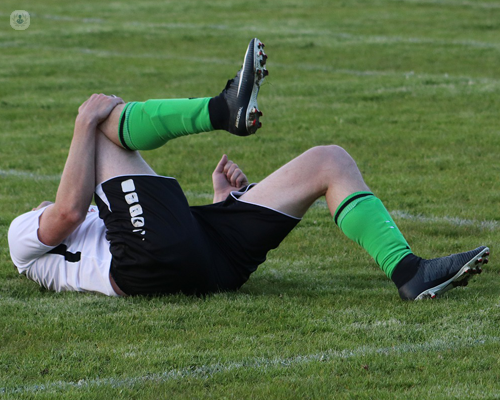Do I knee-d to get it checked? Sports injuries and osteoarthritis of the knee.
Written in association with:Highly-regarded founding director of Opus Biological and senior football and sports medicine physician, Dr David Porter explains why athletes often get knee injuries and how some of these injuries can lead to osteoarthritis of the knee, in addition to looking at other causes. The London-based physician discusses treatment options for knee osteoarthritis and what happens if it is left untreated?

Why are knee injuries in general so common amongst high-profile elite sportsmen and women?
Knee injuries are one of the most common injuries in high profile elite sportsmen and women because of the load and intensity they endure in training for and competing in their individual sports. The amount of force that can go through the knee joint is incredible in someone who is, for example, chasing down a football into the far corner of a pitch and having to decelerate at the very last moment in order to win that ball. This action puts their knee or knees under a huge amount of stress and humans are not naturally built for that particular type of movement. Therefore, they are more likely to endure an injury to the knee. A traumatic injury to the joint is more likely to precipitate someone to have knee osteoarthritis later in their life.
What are the other main causes of knee osteoarthritis?
The primary cause of knee osteoarthritis is aging. As we get older, we are more likely to get osteoarthritis because the knee is one of the larger joints in the body and there's a lot of biomechanical stresses that go through that joint.
The ever-growing trend of increased body weight leading to obesity has been shown to play a huge part in people developing osteoarthritis of their knees.
There is also a good amount of evidence that there is a part genetics play in the causation of osteoarthritis. We know that some people are predisposed to knee osteoarthritis because of some anatomical differences that they may have, which could be in their hips, bones, or lower limbs that may predispose them to getting osteoarthritis of the knees at later stages in their life.
Lastly, we also know that if you're female you're more likely to develop osteoarthritis of the knees than you are if you are male.
What treatment options do you offer for knee osteoarthritis?
Opus Biological offers a wide variety of treatments for knee osteoarthritis. These treatments span a wide spectrum, starting with simple things like losing weight and good physiotherapy, and then you augment that with different more complex treatments. These may be supplements or pain relief, but also it may be some injection therapies. Opus Biological believes in some of the natural healing effects of our body's own cells and we use treatments like platelet-rich plasma and stem cell therapy to help people with new osteoarthritis.
What could happen if knee osteoarthritis is left untreated?
If you leave knee osteoarthritis untreated the likelihood is that the two most common symptoms of osteoarthritis will become more and more debilitating. The first one is pain. Most people with knee osteoarthritis end up seeing a doctor because they have pain which is likely to get worse and worse over time if left untreated. The second reason why people come to see me is because they have a functional deficit of some sort. This may be that they cannot go for a walk without having pain or they cannot perform a particular physical activity or their sport of choice because of a lack of function. Patients may be unable to flex their knees, unable to extend the knee, or they're unable to pivot or rotate because of pain and some sort of anatomical change of the knee itself.
If you would like to book a consultation with Dr David Porter to discuss the best treatment option for you, you can do so via his Top Doctors profile.


